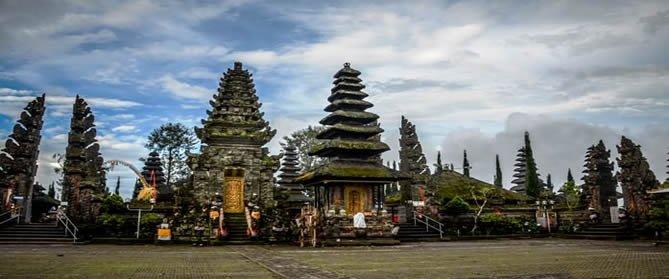|
Map Bangli
 BANGLI REGENCY As Lake Batur located in the Bangli Regency, was a major source of irrigation water for south & east Bali, the regency was greatly fought over by neighboring rulers. Bangli became the capital of this Balinese kingdom in the year Balinese Icaka year of 1204. Sites: Bangli Town - Located in the southern part of the regency, on the foothills of the Batur volcanic range -: The ancient Kehen Temple (Pura Kehen) in Bangli, is famous for having been built under an enormous Banyan tree*.. The walls are inlayed with pieces of chipped porcelain and the upper sanctuary has 11 tapering merus (resting places of the gods). There is a small museum (Saison Buddha Bangle) nearby. Every 3 years the Kehen temple celebrates a unique festival, in which offerings tower high in the courtyard and ritual Baris Warrior Dances are performed utilizing different weapons. The nearby Sasana Art Centre also organizes the occasional art & dance performance. The view beyond the town of Bangli, from Demulih Hill (Bukit), offers and astounding view. (* These trees -fiches benjeminica or religiosa-, visible all over Bali, can grow with or without aerial roots. They are of special significance to the Balinese who believe that they are the dwelling place of spirits. They are usually sashed around the trunk, with a chequered black & white cloth, and are the recipients of many daily offerings.) Bamboo Forest nr. Kubu : Located 5kms. From Bangli; many different types of bamboo, such as Petung and Bambu Talang grow in this forest, the sound of the wind blowing through the bamboo is quite unique. Dusun Kuning Waterfall - 6 kms. South of Bangli; near to Dusun Kuning village is a 25 m. high waterfall that flows into the Melangit River to the south. The cool and shady clove-tree forest that surrounds these falls is home to hordes of monkeys. Mount Batur -1'750m. Last active 1926. The Batur complex has been described as one of the largest and finest calderas in the world, (caldera being a volcano with a lake in the centre of the crater). Lake Batur, is a major source of irrigation water for both south & east Bali. On the western shore is Toyah Bungkah; surrounded by a stark volcanic landscape is an ideal spot for fishing and swimming. A hot spring, with supposed curative powers, is worth a visit. Terunyan village - Located on Northeast shore of Lake Batur, and only accessible by a 30 minute boat trip, departing from Kedisan village, located on the southern side of the lake. (The name of this village is derived from the words Taru & Menyan - the smell of the fragrant tree of incense growing in this village). One of Bali's most famous sites, this village's immaculately kept houses, streets and grass verges are reminiscent of what Bali might have looked like in days gone by. This Bali Aga village does not perform the ngaben, or usual cremation ceremony, that Bali is famous for, but uniquely preserves it's deceased by leaving the bodies, (although covered in shrouds, the face is left uncovered) under the fragrant & magical, incense tree. This method of "embalming" is called Mepasah. Trunyan's temple is the Pancering Jagat Temple (or navel of the world temple) and houses a 4 meter high statue known as Arca da Tonta. The Barong Brutuk dance is staged here on the full moon of (Purnama) Sasih Kapat. Masked dancers whip bystanders & spectators in this totally unique land fertility dance. Penglipuran Village - A traditional, picturesque Balinese village, with a population of 750. The Penglipuran Heroes Monument was built here in commemoration of Cpt. Anak Agung Gde Mudita and his troops. Pengotan Village - A traditional pre Majapahit village with different traits and customs than other villages in Bali. Many unique dances are staged at Pura Penataran during temple festivals. The Papah "war', various Baris dances and even the manner in which they bury their deceased is completely different to that other Balinese villages. Penulisan - Picturesque village with panoramic views. Nearby in the village of Tegeh Koripan, a temple with a long flight of stairs is often shrouded in mist giving it a magical appearance. Pura Dalem Balingkang - Pinggan Village (located in the northern part of Lake Batur) originally built as a palace, this unique temple has a delightful mix of Balinese and Chinese influences. Picturesque mountain scenery. Puncak Penulisan Temple - This temple located on Penulisan hill, the dividing line between north and south Bali, consists of 5 different temple complexes situated on various terraces. Stone statues in the fifth complex are believed to be from the megalithic era. Pura Ulun Danu Batur - 990m above sea level - in Kalanganyar, Batur Village, Kintamani District. These surviving shrines of this temple were relocated to its present location after a devastating eruption in 1917.An anniversary ceremony (Ngusaba Ke Dasa) is held each year. This temple houses an impressive Gong Gede (large gong) which is used to accompany the sacred Baris & Rejang dances which usually take place around the third week of March. Taman Bali Raja - A large water garden temple built by King Sang Anom. Ponds and water features with a vast array of tropical flora surround this temple. Bangli's Arts & Crafts Article Village - Palm Leaf Handicrafts - Cempaga, Tanggahan, Peken, Susut, Kayubihi, Undisan, Throughout Bangli - Gold & Silver - Bamboo Handicrafts - Wood Carving(Furniture & temple) Other sites are: Balai Seni Art centre - Kintamani. Subandar shrine. Penelokan - volcano & Lake view. |
|






